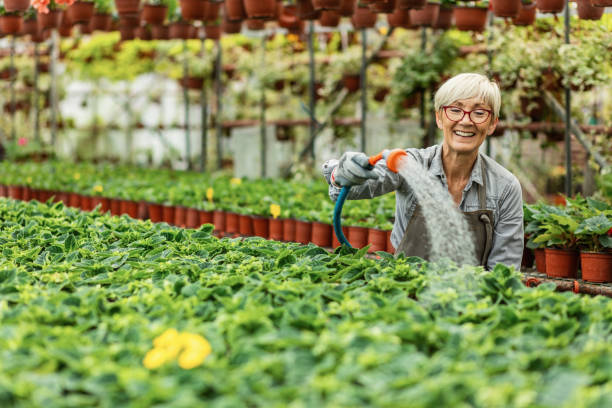Plant nurseries serve as foundational pillars in the realms of horticulture, agriculture, and home gardening. These specialized establishments provide controlled environments where plants, particularly young ones, can grow and develop before being transplanted into their permanent locations. As gardening gains popularity for both leisure and sustainability, understanding the multifaceted benefits of plant nurseries becomes increasingly important. This comprehensive guide about the benefits of plant nurseries webfreen.com delves into the numerous advantages offered by plant nurseries and their pivotal role in fostering healthier, more successful gardens.
High-Quality Plant Selection
One of the primary benefits of plant nurseries webfreen.com is access to high-quality plants. Nurseries specialize in propagating plants from seeds, cuttings, or grafting, ensuring that the specimens are robust, healthy, and ready for transplantation. They provide a controlled environment that protects young plants from harsh weather conditions, pests, and diseases—common challenges in open fields. Managed by professional horticulturists, nurseries offer plants optimal care, including precise watering, fertilization, and pruning techniques. Moreover, many nurseries adhere to strict hygiene practices to prevent the spread of plant diseases, reducing the risk of introducing pests or pathogens into your garden.
Wide Variety of Plants
Plant nurseries often boast an extensive selection of plants, including rare and exotic species that may not be readily available elsewhere. This diversity allows gardeners to access specialty plants, experiment with new varieties each season, and find plants that are in season and ready to thrive under current weather conditions. Whether you’re seeking a specific type of rose, an heirloom vegetable, or a rare tropical plant, nurseries are likely to have it or can procure it for you.
Expert Advice and Guidance
Purchasing from a plant nursery comes with the invaluable benefit of expert advice. Nursery staff are typically knowledgeable horticulturists who can provide insights on planting techniques, soil and fertilization recommendations, pest and disease management, and design and landscaping ideas. This guidance is particularly beneficial for novice gardeners who may be unfamiliar with the specific needs of different plant species.
Cost-Effective Gardening
Plant nurseries can be a cost-effective option for gardeners. Purchasing young plants from a nursery is often more economical than starting from seeds, especially for those lacking the necessary equipment or expertise. Plants from nurseries have a higher survival rate after transplantation, reducing the cost of replacement. Additionally, nurseries often offer discounts for bulk purchases and provide ready-to-plant options, saving gardeners the expense of specialized equipment needed for seed propagation.
Supporting Local Economy
Buying plants from local nurseries supports the local economy by providing jobs and contributing to the community’s economic well-being. Local nurseries often grow native plants that are more likely to thrive in your garden’s specific climate and soil conditions. They also tend to promote sustainable practices, such as using organic fertilizers and avoiding harmful pesticides, and offer a more personalized shopping experience compared to larger chain garden centers.
Environmentally Friendly Practices
Many plant nurseries are at the forefront of promoting environmentally friendly practices. These include sustainable growing techniques like rainwater harvesting, composting, and organic farming. By growing and selling plants locally, nurseries help reduce the carbon footprint associated with transporting plants over long distances. Advanced irrigation techniques used in nurseries also contribute to water conservation, an increasingly precious resource.
Community and Educational Resources
Plant nurseries often serve as community hubs for gardening enthusiasts. They may offer workshops, classes, and other educational resources that help individuals learn more about gardening, plant care, and environmental stewardship. These programs can range from gardening workshops and children’s educational initiatives to networking opportunities for gardeners to connect, share tips, and exchange plants and seeds.
Plant Health and Longevity
Plants grown in nurseries generally enjoy better health and longer lifespans compared to those sourced from other places. This is due to controlled growth conditions that ensure plants develop strong root systems and are less stressed when transplanted. Nurseries maintain optimal growing conditions, leading to a smoother transition and better growth in your garden. Many nurseries also offer after-purchase support, providing advice and assistance if your plant faces any issues post-planting.
Convenience and Time-Saving
Plant nurseries offer unparalleled convenience. For busy gardeners or those new to gardening, the time and effort saved by purchasing plants from a nursery can be significant. Nurseries sell plants that are ready to be transplanted, eliminating the time and effort needed to grow plants from seeds. They often carry not only plants but also gardening supplies, including soil, fertilizer, pots, and tools, making it easy to find everything you need in one place.
Enhancing Biodiversity
Plant nurseries contribute to biodiversity by offering a wide range of plant species, including rare and endangered varieties. This enhances the ecological health of your garden and supports local wildlife. Nurseries often stock plants that attract pollinators like bees and butterflies, which are essential for a healthy ecosystem. By providing a variety of plants, nurseries help gardeners create diverse habitats that support a wider range of wildlife, from insects to birds.
Customized Solutions
Plant nurseries can offer customized solutions to fit your specific gardening needs. Whether you have a small urban garden, a large estate, or a specialized project, nurseries can provide tailored plant recommendations based on your garden’s conditions and your personal preferences. If you need a specific plant that isn’t in stock, many nurseries can source it for you, ensuring you get exactly what you need. Some nurseries also offer additional services such as garden design, soil testing, and plant installation, providing a complete package for your gardening needs.
Contribution to Sustainability
By encouraging the use of native plants and sustainable gardening practices, nurseries play a vital role in promoting sustainability. Sustainable gardening practices contribute to soil health, water conservation, and wildlife support. Plants that are well-suited to the local environment require fewer chemical inputs, helping maintain healthy, fertile soil. Native plants often need less water than non-native species, reducing the demand on local water supplies. Additionally, the promotion of drought-resistant and pest-resistant plants helps reduce the need for harmful pesticides and excessive watering, fostering a more sustainable gardening approach.
Therapeutic and Mental Health Benefits
Speaking of the benefits of plant nurseries webfreen.com, gardening has long been recognized for its therapeutic benefits, and plant nurseries play a crucial role in providing access to plants that support mental well-being. Interacting with plants, whether by nurturing them at home or simply walking through a well-maintained nursery, has been shown to reduce stress, anxiety, and depression. Many people find solace in caring for plants, and the act of gardening can be a form of mindfulness, promoting relaxation and a sense of accomplishment. Nurseries offer a variety of plants suited for therapeutic gardening, including fragrant herbs like lavender and chamomile, which have calming properties.
Improving Air Quality
One of the underrated the benefits of plant nurseries webfreen.com is their contribution to improving air quality. Plants naturally filter pollutants from the air, absorbing carbon dioxide and releasing oxygen. By making high-quality plants available to individuals and communities, nurseries help people create green spaces that act as natural air purifiers. Certain plants, such as snake plants, peace lilies, and spider plants, are particularly effective at removing toxins from indoor air, making them ideal choices for home and office spaces.
Encouraging Urban Greening
With rapid urbanization, green spaces are becoming increasingly scarce. Plant nurseries play a crucial role in urban greening initiatives by supplying plants for community gardens, public parks, and green rooftops. Many cities are now integrating more plants into their infrastructure to combat the heat island effect, improve urban biodiversity, and create more livable environments. Nurseries support these efforts by providing suitable plant species, including drought-tolerant and low-maintenance varieties that thrive in urban settings.
Boosting Agricultural and Commercial Landscaping
Plant nurseries are integral to commercial and agricultural industries, supplying high-quality plants to farms, orchards, vineyards, and large-scale landscaping projects. In agriculture, nurseries provide farmers with disease-resistant and high-yield crops, contributing to food security and economic growth. In commercial landscaping, nurseries supply ornamental plants, trees, and shrubs that enhance the aesthetic appeal of businesses, hotels, and public spaces. The availability of well-cultivated plants ensures successful projects and long-term sustainability.
Personalized Gardening Solutions
Whether you are an experienced gardener or just starting, plant nurseries offer personalized solutions to help you succeed. Many nurseries provide soil testing services, allowing customers to determine the best plants for their specific soil conditions. They also offer custom plant arrangements, helping homeowners design gardens that suit their preferences and environmental conditions. Some nurseries even provide delivery and planting services, ensuring a seamless gardening experience.
Promoting Seed Preservation and Conservation
Many plant nurseries participate in seed-saving programs and conservation efforts aimed at preserving heirloom and indigenous plant varieties. By maintaining a diverse collection of plant species, nurseries help protect genetic diversity and prevent the loss of rare or endangered plants. This is especially important for food crops, as heirloom vegetables and fruits often have superior flavors, nutritional value, and resistance to certain pests and diseases.
Educational Opportunities for All Ages
Plant nurseries are excellent learning spaces for both children and adults. Schools, gardening clubs, and environmental organizations frequently partner with nurseries to teach people about plant care, sustainability, and ecosystem preservation. Hands-on learning experiences, such as planting workshops and guided nursery tours, foster a deeper appreciation for nature and encourage future generations to engage in gardening and environmental stewardship.
The Joy of Gardening Starts at a Nursery
In conclusion, the benefits of plant nurseries webfreen.com provide an invaluable service to gardeners, farmers, landscapers, and communities. They offer high-quality plants, expert guidance, and sustainable solutions while supporting biodiversity, economic growth, and environmental health.
Whether you’re looking to beautify your home, grow your own food, or create a green sanctuary, a plant nursery is the perfect starting point. Investing in plants from a nursery ensures that you are getting strong, healthy specimens that will thrive in your garden, bringing beauty, functionality, and ecological benefits for years to come.
By choosing to buy from plant nurseries, you are not just investing in your garden but also contributing to a greener, healthier planet.
For more, continue to read at newsmetre.com














